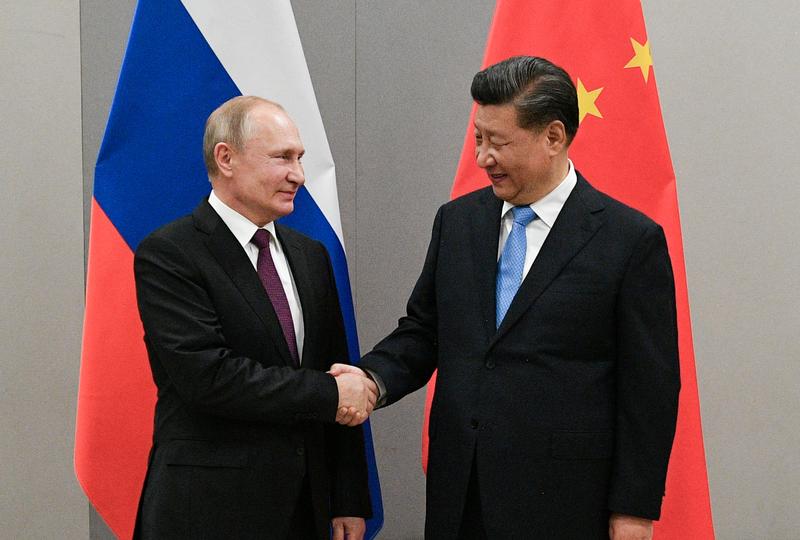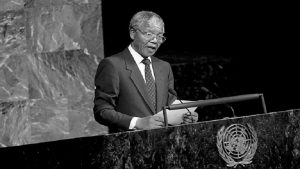The antagonistic US foreign policy stance towards both Russia and China has led in recent times to closer cooperation between Moscow and Beijing in a spirit of “besieged mentality” created unwittingly by Washington.
From the Obama administration through to Trump, and now under the Biden administration, relations between the US-led Western powers on the one hand and Russia and China on the other have remained more lukewarm than blossoming. But the reasons are not hard to fathom: Washington’s notion of being the world’s only remaining superpower since the dissolution of the Soviet Union and the end of the Cold War in 1991 appears to mistakenly create the impression that the US is omnipotent.
It fails to take into cognisance the rapidly globalizing world which has fostered inter-connectedness and inter-dependence among nations, obliterating the age-old principle of Westphalian borders.
The US national politics could also be blamed for misguiding the country’s foreign policy formulation. Being anti-Russian in the US has come to be accepted as an element of “political correctness”. As a result, the US has in recent history seen a proliferation of anti-Russian sentiments and unfounded allegations of wrong-doing against Moscow peddled in the free-for-all public commentary. An interviewer recently dragged President Joe Biden into saying that the Russian president Vladimir Putin “is a killer” in the weeks leading up to the Biden-Putin Summit in Switzerland. President Biden later refused to repeat the claim in spite of mischievous attempts to do so in order to draw a wedge between him and Putin ahead of their crucial first-ever face-to-face meeting.
In Russia and China, authorities use anti-Americanism sentiments to build domestic consensus by making an evidence-based case of US-led Western-orchestrated hostilities.
However, Beijing and Moscow, too often at the receiving end of hostile US policies towards their respective nations, have elected to forge tighter ties instead. It is an act of solidarity in the face of threats to their sovereignty.
China’s foreign minister Wang Yi recently noted that the fight against COVID-19 has further served to bolster the modern-day bilateral relations between the two global power giants.
“China-Russia relations have stood the test of a once-in-a-century pandemic and unprecedented global changes, and reached a historic high in all respects,” Yi said.
He also cited the constant communication between Chinese President Xi Jinping and his Russian counterpart Vladimir Putin as proof of water-tight relations. Most of such interactions are hardly a matter for public relations exercises. However, decisions of astronomical proportions affecting geopolitics and strategic balance are taken.
Last month, a Chinese poll revealed that more than half of the 2000 respondents viewed Russia as their most important neighbour ahead of a host of other nearby Asian nations.
China-Russia relations, also known as Sino-Russia relations, are therefore a constant concern and source of major worry to the domineering global North. The recent G7 meeting in London that was immediately followed by a Summit of the North Atlantic Treaty Organisation (NATO) in Brussels both raised their concerns about Russia and China as separate but collective threats to the Western dominance of the world, or “the democratic world” as they call it.
Whilst in London, President Biden also publicly raised the worrying closer military cooperation between Moscow and Beijing in the Arctic region, where Russia is the current occupant of the two-year rotational chair of the Arctic Council.
Although China is not officially part of the Arctic nations, the country’s close proximity to the Arctic Circle and its rapidly growing international stature and influence is a major source of consternation particularly for the US, as seen by President Biden’s recent remarks in London.
Russia’s Foreign Minister Sergei Lavrov recently referred to China as Russia’s “priority partner” in the Arctic.
The Arctic is one of the world’s most strategic Geographical areas, located at the northernmost part of the Earth as a “polar region” and consisting mainly of the Arctic Ocean, adjacent seas, and parts of Alaska in the US. The eight Arctic states who make up the Arctic are Canada, the Kingdom of Demark (which includes the autonomous constituent countries of Greenland and the Faroe Islands), Finland, Iceland, Norway, Russia, Sweden and the US.
It is this composition that makes the relationship between Russia’s and China’s diplomatic interaction with NATO and the West a lot more tricky. With the exception of the US, none of the Arctic Circle members are trigger-happy and dialogue, instead of confrontation, is evidently their preferred way of inter-relations.
Although Russia-China relations have been stronger for Donkey’s Years, the 2008 global financial crisis brought them ever closer. And, since 2014 when Russia took over Crimea from Ukraine and triggered a barrage of unsuccessful Western economic sanctions, business relations between Beijing and Moscow have risen exponentially.
The advent of COVID-19 has also served as nourishment to Russia-China relations. Russia has recently turned to China to manufacture more Sputnik V vaccines in the wake of drastically rising demands.
Closer ties between Moscow and Beijing are understandably bad news for Washington and the West. Both countries are nuclear powers with huge populations, with China’s people more than 1.4 billion and Russia more than 145 million, according to the UN 2021 statistics.
Conversely, closer ties between Russia and China are indeed good news for the global South. Closer to home, a stronger bond between Moscow and Beijing is also fantastic news for the BRICS bloc.
The countries of BRICS (Brazil, Russia, India, China and South Africa), when combined form a significant base of the global population at 3.12 billion. Together, they account for more than 30% of the global GDP.
Russia and China are also two of the only five permanent members of the UN Security Council who possess a veto power.
Other BRICS members can therefore benefit from this scenario in a similar way to the manner in which the State of Israel continually and constantly benefit from the USA’s penchant to veto any resolution that condemns Israel’s illegal occupation of the State of Palestine. That is the powerful advantage that both Russia and China bring to BRICS.
The members need only to formulate a common foreign policy position that benefits all members.
China and Russia further have enormous interest in the development of Africa. One need only visit the HQ of the AU in the Ethiopian capital Addis Ababa to see the majestic building that China has built.
The two countries have enormous socio-political and economic interests in Africa, with both contributing to the UN peacekeeping force on the continent. The other distinctive aspect between Russia and China is that none of them ever colonised any African State and looted the wealth belonging to the locals, as was the case with former colonial masters such as France, Belgium, Germany, Spain, Portugal and UK, among others.
In the final analysis, the successful ties between Russia and China are to the benefit not only of BRICS but also of the entire global South. Ends






